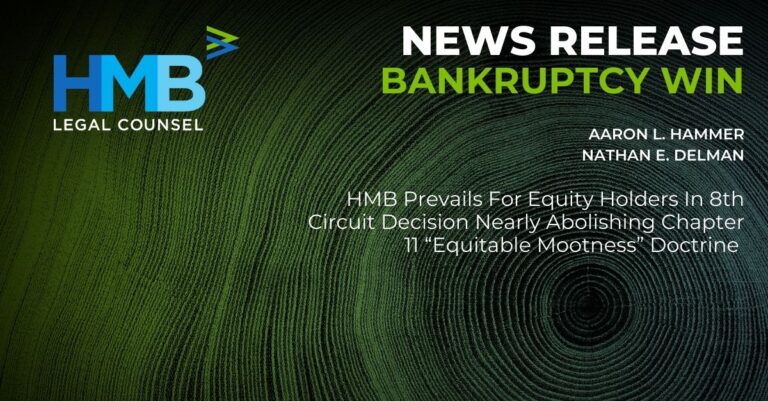HMB’s Bankruptcy, Reorganization and Creditors’ Rights Team including Aaron Hammer, Nathan Delman and the late John Guzzardo, representing FishDish, LLP, preferred shareholders holders of the bankrupt VeroBlue Farms USA, Inc. at the U.S. Court of Appeals for the Eighth Circuit, successfully argued that the District Court prematurely dismissed FishDish’s appeal by improperly invoking the judicial doctrine known commonly known as “Equitable Mootness.”
After decades of sidestepping the issue, the Eighth Circuit finally created its own equitable mootness standard, requiring lower appellate courts to fully examine the underlying merits of a bankruptcy appeal rather than relying on equitable mootness for a swift dismissal. If lower courts do not follow suit, the Eighth Circuit believed it will prime the U.S. Supreme Court to potentially abolish its use. You can read the full opinion here.
BACKGROUND
In 2019, the Northern District of Iowa dismissed FishDish’s extensive challenges to the fish farm’s confirmed bankruptcy plan. The court relied on equitable mootness, citing that amounts already paid under the plan made it too difficult to afford FishDish any relief.
During the bankruptcy proceedings, the unsecured creditors’ committee timely filed a challenge notice instructing the debtors to commence litigation against its secured lender and majority equity holder. The creditors’ committee reached a settlement on a chapter 11 plan. As summarized by Bill Rochelle in the American Bankruptcy Institute’s Rochelle’s Daily Wire, “In return for a dollop of consideration for unsecured creditors, the committee dropped its objection to the secured claim. The bankruptcy court soon after ruled that secured debt was sacrosanct because there had been no timely objection.”
THE DECISION
The Eighth Circuit's three-judge panel’s decision, written by Circuit Judge James P. Loken, held that the District Court erred in dismissing the appeal, and the district court should have fully examined FishDish's claims, including the claim that certain owners, operators and alleged senior creditors of VeroBlue Farms acted in bad faith in the chapter 11, unfairly shifting terms in their favor only to sell the business afterward. FishDish also filed multiple objections to the debtor’s chapter 11 plan, only for those objections to be dismissed, first by the Bankruptcy Court and then again by the District Court.
“The U.S. Constitution requires due process, not just judicial process. For almost three years now, FishDish and many other shareholders have been denied their fundamental due process rights in the chapter 11 case of VeroBlue Farms”, said Aaron Hammer, Chair of HMB’s Bankruptcy, Reorganization and Creditors’ Rights Practice Group. “We were confident that the District Court’s hasty dismissal of FishDish’s meritorious objections to VeroBlue Farm’s chapter 11 plan required further review and are pleased that we can finally give our client its long-overdue day in court.”
HMB argued that equitable mootness is a highly problematic doctrine that has become unmoored from its original purpose. As detailed in its briefs, appellate courts initially designed this equitable doctrine to avoid upsetting carefully arranged multi-party agreements in complex chapter 11s. However, over the past several decades, the doctrine has been applied to simpler chapter 11s and even consumer chapter 7s and 13s. HMB’s Nathan Delman declared in his oral argument, “equitable mootness has run amok,” and urged the court to follow Third Circuit jurisprudence and narrowly apply the doctrine, if not abandon it altogether. Judge Loken writes:
The equitable mootness doctrine is based on a recognition that even when the moving party is not entitled to dismissal on Article III grounds, common sense or equitable considerations may justify a decision not to decide a case on the merits. Numerous Chapter 11 plan confirmation appeals have been dismissed when, even though effective relief could conceivably be fashioned, implementation of that relief would be inequitable. If limited in scope and cautiously applied, this doctrine provides a vehicle whereby the court can prevent substantial harm to numerous parties.
The Eight Circuit also noted that:
Regarding the central issue on appeal, what has misleadingly come to be known as “equitable mootness,” like the Tenth Circuit we agree with every other circuit to consider the issue that equitable, prudential, or pragmatic considerations can render an appeal of a bankruptcy court decision moot even when the appeal is not constitutionally moot. However, invoking this doctrine often results in the refusal of the Article III courts to entertain a live appeal over which they indisputably possess statutory jurisdiction and in which meaningful relief can be awarded. (internal citations omitted)
WHAT’S NEXT?
The District Court will now have to review the underlying merits of FishDish’s appeal. The opinion also cautioned that if equitable mootness, "becomes the rule of appellate bankruptcy jurisprudence" rather than an exception to appellate review, "we predict the Supreme Court, having up to now denied petitions for certiorari to review the doctrine, will step in and severely curtail — perhaps even abolish — its use." With two petitions for certiorari now currently before the Supreme Court, the death of the equitable mootness doctrine may soon be upon us.
For more information, please reach out to Aaron Hammer and Nathan Delman. Further reading can be found (subscription may be required) below:
American Bankruptcy Institute’s Rochelle’s Daily Wire




